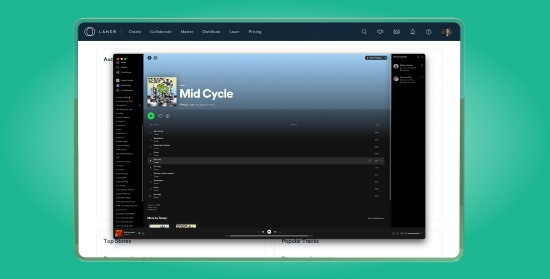What Are Songwriting Splits and Why You Need to Agree on Them Now

Music mogul Simon Cowell recently parted ways with Little Mix, the girl group he championed and signed after they won the X Factor in 2011. The reported reason? He had a falling out with their reps Modest Management amid a row over the songwriting splits on their single “Woman Like Me.”
Some may think it’s a drastic move over a relatively inconsequential issue, but such fallouts are becoming more common than ever before – especially considering the exponential growth in the number of credited songwriters on today’s big hits.
The concept that leads to songwriting crediting headaches like these are called splits.
And every songwriter and musician distributing their music should know what they are and why they matter. It will help you avoid a lot of grief down the road.
But splits aren’t always simple. So to help you get clear on splits, here’s everything you need to know.
Hot tip: LANDR Distribution now offers the ability to create automatic royalty splits directly within any release. Start a release and make sure everyone is paid fairly and quickly for all streaming revenue.
The basics: who owns what?
Before you start, it’s important to understand the two different copyright types for a record:
- The master right is the ownership of the sound recording, most commonly owned by the label
- The composition right is the ownership of the underlying song, sometimes referred to as the publishing right
This composition right is split between the songwriters and their respective publishers. The percentage each one gets – the split – needs to be agreed between all parties before the record is released.

What’s a fair split?
I often get asked by artists and budding songwriters what kind of share they should ask for when they work with other writers.
Do you want to work with them again? If so, split equally.
Sometimes the question evolves from their feeling that they did more than the other writer(s). My first response is always: “Do you want to work with them again? If so, split equally.”
The common response is to argue that they came up with both the melody and lyrics so should get more, but my point is that it’s difficult to quantify the value of someone’s contribution.
It may be something simple like changing the format of the song – like taking out the pre-chorus or adding an earworm hook – that’s the difference between a hit and just an average track.
Partnership splits
Perhaps the most famous example of sharing songwriting duties is the Lennon-McCartney partnership.
In retrospect, we now know that certain Beatles songs were written by Paul and others by John, yet they were all credited 50/50 between the two. It can be argued that together they were more than the sum of their parts.
Perhaps the fact that they had to get the approval of each other affected the quality enough to make the songs more succinct and pleasing to both Lennon’s tougher, more political taste and Paul’s love of beautiful, sweeter melodies?

People tend to fight for their ideas in order to get a bigger share, not for the better of the song.
Splits that keep the band together
Another danger with dividing the splits according to who came up with what lines is that people tend to fight for their ideas in order to get a bigger share, not for the better of the song.
Some credit U2’s longevity to splitting every song equally – even giving their longtime manager Paul McGuinness an equal share, as if he was part of the band.
Everyone in Coldplay also gets a share of each song, no matter if Chris Martin came into the studio with a finished composition or not.
Meanwhile, there is a long line of band break-ups spurred by begrudging band members who feel their contribution was not acknowledged enough when one person took 100% of the songwriting credits, earning considerably more than the rest of the band.
Songwriting by committee
In Nashville, the rule tends to be that you split it equally between however many people are in the room during the writing session.
In Nashville, the rule tends to be that you split it equally between however many people are in the room during the writing session.
But in the last decade, thanks to technology enabling us to work remotely, sending files back and forth, this rule no longer applies. Now it’s not uncommon for a DJ or producer to send out an instrumental to 10 or more “topline” writers, then cherry-pick sections from several of them, with a chorus from one, a verse from another, a bridge from a third etc.
In hip-hop and EDM, in particular, contributions that used to be seen simply as arrangement (and so not eligible for a share of the publishing) are now often claimed to be songwriting contributions – including drum programming.
Add sampling and inclusion of hooks from other tracks, and it’s not surprising that the average number of credited songwriters in the US market’s Top 10 streaming hits of 2018, was as high as 9.1 per track.

Songwriting splits for streaming services in 2022
With today’s digital distribution services that make it easy to get your tracks on streaming platforms, sorting out songwriting splits is now just as important as royalty splits.
Some digital distribution services provide the feature—they make it easy to decide who gets what before releasing.
They’ll even take care of paying everything out to the correct accounts of each collaborator so everyone is paid on time and hassle-free.
When you set up your songwriting splits, chances are they’ll mirror whatever’s been agreed on regarding royalty splits, so you’ll just need to punch in your split percentages and everything will be taken care of.
If having the ability to split streaming revenue easily is essential for your project, definitely pick a distribution service provider that can offer this feature.
LANDR Distribution, for example, offers this kind of service and is backed by an incredible team of human support professionals who can help you along the way.
The finishing touch
Finally, there’s the infamous artist motto “change a word, get a third”, when an artist who receives a finished track wants a share of the songwriting in order to cut it.
UK songwriter Dyo says she usually leaves a verse lyric unwritten for the artist to contribute to, so that the artist feels part of the writing process.
In these cases, it’s all up for negotiation. As with all negotiations, those who are willing to walk away hold most of the power.
You have to figure out how likely you are to get the song covered by someone else. If the artist is big enough, it could be worth giving up a bigger share. After all, having 15% of a Drake track could be worth more than having 50% of the same track released by an unknown artist.
The biggest obstacle to getting the splits sorted is the reluctance we songwriters have to discuss them.
Negotiate your songwriting splits early
The biggest obstacle to getting the splits sorted is the reluctance we songwriters have to discuss them. I know, because I avoided it for most of my songwriting career. I describe it as akin to giving someone a prenup on a first date – in other words, a real vibe killer.
But, no matter how awkward, how many writers and how uneven the splits are, you need to discuss splits early if you want to get paid correctly – or even at all.
If the split agreement and registration of the song with your Performing Rights Organisation (ASCAP/BMI/SOCAN/PRS etc) is incomplete or under dispute, no one will get paid.
This is more common than you think. A few years ago, the CEO of UK performing rights association PRS relayed that one of Beyoncé’s albums was still under dispute 18 months after release. No doubt, Beyoncé still had the money to pay her bills, but the same might not have been true for some of the co-writers.
To make sure you get paid when your track is streamed, broadcast on the radio or TV, or performed at a concert, you need to make sure that your PRO has a “clean” registration of it before it’s released.
This means they have information of who wrote it, what their IPI/CAE (songwriter ID) numbers are, who their publisher is (if any), and that everyone’s share of the song adds up to 100% – not 101% or more.
If you want to make music for a living you need to manage all your rights, so you get paid and credited correctly.
Face the music
No one becomes a music creator in order to do admin, but if you want to make music for a living you need to manage all your rights, so you get paid and credited correctly.
Bite the bullet and discuss how you and your co-writers should split the songwriting credits sooner rather than later, to prevent tears and arguments down the line – or, as in Little Mix’s case, even falling out with your label.
Gear guides, tips, tutorials, inspiration and more—delivered weekly.
Keep up with the LANDR Blog.
Latest posts
